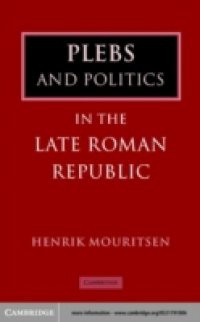Plebs and Politics in the Late Roman Republic analyses the political role of the masses in a profoundly aristocratic society. Constitutionally the populus Romanus wielded almost unlimited powers, controlling legislation and the election of officials, a fact which has inspired 'democratic' readings of the Roman republic. In this book a distinction is drawn between the formal powers of the Roman people and the practical realization of these powers. The question is approached from a quantitative as well as a qualitative perspective, asking how large these crowds were, and how their size affected their social composition. Building on those investigations, the different types of meetings and assemblies are analysed. The result is a picture of the place of the masses in the running of the Roman state, which challenges the 'democratic' interpretation, and presents a society riven by social conflicts and a widening gap between rich and poor.

